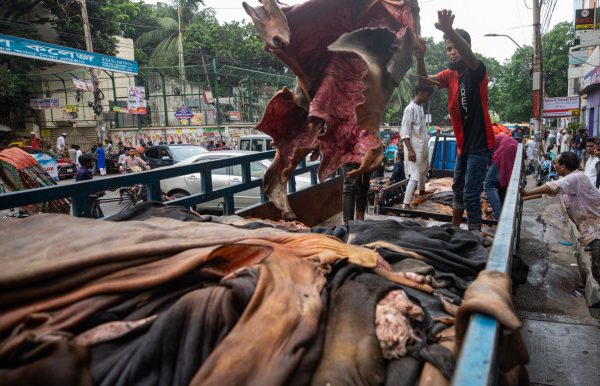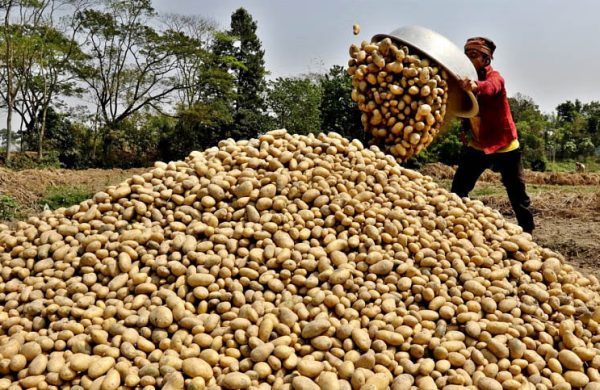Seasonal traders frustrated over rawhide prices as wholesalers offer below rates
- Update Time : Thursday, June 20, 2024

Industry insiders say this year traders aimed to collect 3.5 lakh pieces of rawhides after Eid-ul-Adha, a target they expect to achieve by the end of this week.
TDS Desk:
Just as many livestock traders faced financial setbacks this year due to low prices of sacrificial animals in cattle markets despite a rise in prices on the eve of Eid-ul-Adha, seasonal rawhide traders are also concerned about not getting fair prices for the hides of sacrificed animals.
Seasonal traders expressed frustration over commercial collectors offering low prices for rawhides although tanners had assured of fair pricing. They allege that wholesale traders are forming syndicates to buy rawhides at low prices.
In Chattogram, wholesalers collected around 2 lakh pieces of rawhides in two days after Eid, but seasonal traders complained that despite a reduction in the price of salt, they have not received good prices for the hides.
However, wholesalers say they do not receive the price fixed by the government, and since there is only one tannery in Chattogram, they must rely on tanneries in Dhaka to sell their rawhides.
Industry insiders say this year traders aimed to collect 3.5 lakh pieces of rawhides after Eid-ul-Adha, a target they expect to achieve by the end of this week.
Meanwhile, tannery owners say the depreciation of rawhide value is primarily due to the inadequate environmental standards in the tannery sector.
The sudden oversupply during Eid-ul-Adha makes it challenging for them to procure and process rawhide, they say.
Kamal Uddin, a seasonal trader in the South Khulshi area of Chattogram city, said, “I purchased each hide for Tk250 to Tk450. Four people collected the hides from house to house, and we also hired a car. However, I sold them for only Tk300 to Tk500 per piece to wholesalers. Many others couldn’t sell their rawhides due to delays.”
According to the Ministry of Commerce’s decision, tannery owners have set prices at Tk55 to Tk60 per square foot for salted cowhide in Dhaka and Tk50 to Tk55 outside Dhaka. Prices for salted goat hides have been fixed at Tk20 to Tk25 per square foot.
Traders note that last year, the price of salt per bag ranged from Tk1,050 to Tk1,100, whereas this year it is around Tk930 per bag.
Mohammad, a teacher at Moghbazar Madrasah which received almost all the rawhide in the area, said, “We trust the tanners to pay the announced price, and we are collecting them. A fair price will support our impoverished students in continuing their education.”
His office set up a temporary desk on the roadside, offering coffee, water, and smiles to people.
“People are curious about any fundamental issues in the seasonal rawhide market, given that over a crore animals are sacrificed every year during Eid-ul-Adha.
Mohammad Ali, owner of AI Leather, a rawhide wholesaler company in Chattogram, said, “Seasonal traders often leave rawhides without salt for a day, leading to deterioration in leather quality and lower prices. Additionally, hides that are cut or torn command reduced prices.”
Md Muslim Uddin, president of Greater Chattogram Rawhide Wholesalers Cooperative, said, “Tannery owners are not purchasing rawhides at the government-set prices. Last year, the price was fixed at Tk47-Tk52 per square foot, but we received only Tk37-Tk40.
“To prevent damage, we have decided to preserve rawhides with salt at upazilas. This year, we purchased large cow hides ranging from Tk300 to Tk800-Tk900.”
Mohammad Ruhul Amin, head of the Chattogram divisional monitoring team formed by the Ministry of Commerce for overseeing leather preservation, buying, selling, and transportation, said, “This year, rawhides have been well-preserved under supervision. Wholesalers have reported receiving unfair prices from tannery owners, and I have forwarded these concerns to the central authorities.”
The Chattogram district administration has initiated efforts to preserve rawhides at the upazila level to prevent damage.
Chattogram Deputy Commissioner Abul Bashar Mohammad Fakhruzzaman said, “Outside the city, arrangements have been made to preserve rawhides at the local level under the supervision of Upazila Nirbahi Officers (UNOs). If local seasonal traders sell these to tannery owners after a week to ten days, they can expect better prices.”
Over the past decade, 21 out of 22 tanneries in Chattogram have closed due to financial losses and failure to comply with environmental standards.
The sole operational tannery, Reef Leather Limited, collects 50,000 pieces of rawhides from Chattogram and another 50,000 from North Bengal during Eid-ul-Adha. Consequently, Chattogram’s wholesalers now rely on tanneries in Dhaka for their rawhide supply.
According to the Chattogram Rawhide Wholesalers Cooperative, there were 112 registered wholesale rawhide traders under the association. Additionally, 70 to 80 wholesalers traditionally purchased rawhides. but currently, only 25-30 traders remain operational.
Mokhlesur Rahman, director (operation and sales) of Chattogram’s sole tannery, Reef Leather Limited, said, “If I can sell at a higher price, then I can afford to buy at a higher price than the government-set rates. However, if I have to sell at lower prices, I must purchase at lower prices.”
“Previously, demand for leather goods was high, but it has recently declined. Consequently, instead of rising, leather prices have decreased. Selling leather to international brands involves meeting various compliance standards, which has increased our investments and expenditures,” he added.
Anjuman-e Rahmania Ahmadia Sunnia Trust and Gausia Committee Bangladesh have taken a target of collecting one lakh pieces of rawhides from the Chattogram metropolitan area, southern district and northern district.
Md Shaheen Ahmed, president of Bangladesh Tanners Association, said, “We are buying a cow’s rawhide at Tk850 on average, and will purchase salt-preserved ones for over Tk1,000.”
“Only a few tanners in Bangladesh are fetching a good price for processed leather, as they adhere to the environmental standards required by international buyers,” he added.
SAME PICTURE IN OTHER DISTRICTS
Mahbub Ul Alam, an accountant in Brahmanbaria, said he was disappointed because no commercial collectors were willing to offer a higher price than Tk150 for a bull they had purchased for Tk91,000.
He said, “In the early 2000s, we used to sell a cowhide for over Tk1,000 when the cow itself cost us between Tk15,000 and Tk25,000.”
There is a growing trend of people donating rawhides to religious entities such as mosques and madrasas.
Alam, a vegetable trader from Madaripur, mentioned that no one came to purchase the hide of the cow he bought for Tk1.6 lakh during Eid-ul-Adha. Eventually, he donated it to a nearby Madrasah charity fund.
The government estimates that 1.2 crore animals will be slaughtered this Eid-ul-Adha. This has prompted hide traders across Bangladesh to preserve their hides with salt for seven days before selling them to tanners, primarily concentrated in Dhaka.

















